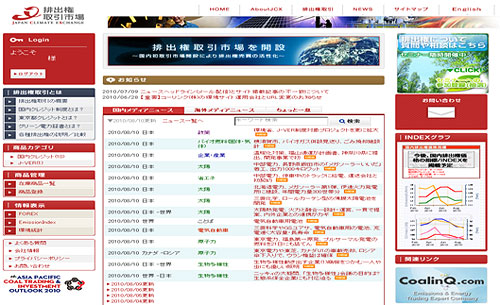Japan Climate Exchange Corporation Made First Trade
- Trade under Tokyo Program Marks First Step to Promoting Emissions Rights Trading -
Aug. 23, 2010
Sojitz Corporation
Japan Climate Exchange Corporation
Japan Climate Exchange Corporation (JCX), a joint venture of CoalinQ Corporation, a wholly-owned subsidiary of Sojitz Corporation, and Smart Energy Co., Ltd., began full-scale operations in July 2010 and completed the first transaction under the Tokyo Cap-and-Trade Program operated by the Tokyo Metropolitan Government. The transaction was for 22 tons over five years at a price of 12,000 yen per ton.

Japan Climate Exchange Corporation’s Internet site
JCX uses a special-purpose Internet site to offer a trading market for fair and transparent trading centered on domestic carbon dioxide emissions rights with the aim of promoting emissions rights trading. Emissions rights that can be traded on market include domestic emissions rights such as Tokyo Cap-and-Trade credits, tradable green certificates, domestic credits, and J-VER as well as overseas emissions rights derived from the Kyoto mechanism. JCX will offer services including seller and buyer matching and provision of information on emissions right trading prices (indexes).
The emissions rights recently traded were created by Osaka-based Daiwa House Industry Co., Ltd. and a company that installed energy-saving facilities. The installing company submitted an application to the Tokyo Metropolitan Government today. This is the first application under the Tokyo Cap-and-Trade Program. The generated credits will be purchased by Tokyo-based Ginga Energy Japan Co., Ltd.
Under Tokyo’s mandatory emissions volume reduction and emissions rights trading program, businesses that meet certain conditions and have business sites in Tokyo are obligated to reduce emissions by 6% to 8% from the base year during the first phase (2010-2014). It is expected that emissions rights trading will increase substantially as businesses carry out their reduction obligations. Saitama Prefecture will also introduce a cap and trade program in 2011, and such programs are expected to spread to other regions in the future.
In light of these developments, JCX expects the emissions rights market to become increasingly active with the aim of preventing global warming. The marketplace is expected to handle 800,000 tons of carbon dioxide in 2015 and 1.3 million tons in 2020.
Reference Information
Overview of Japan Climate Exchange Corporation
| Name | Japan Climate Exchange Corporation |
|---|---|
| Address | 6-1-20 Akasaka, Minato-ku, Tokyo |
| Officers | Representative Director: Testsuo Furuta Directors: Masanori Eto Shigeru Nishihara Takuya Ogushi Hiroyoshi Niwa |
| 法人の目的 | ① Operation of an emissions rights trading market; ② Provision of environmental information; ③ Advertising business for environmental companies; and ④ All activities incidental or related to the above. |
| Shareholders | CoalinQ Corporation (60%), Smart Energy Co., Ltd. (40%) |
| Website | http://www.jcx.co.jp/ |
Overview of the Tokyo Cap-and-Trade Program
| Ordinance | Environmental Ordinance to Ensure the Health and Safety of the People of Tokyo |
|---|---|
| Subject Business Sites | Business sites that use 1,500 kl or more crude oil equivalent of fuel, heat, or electrical energy. Businesses are obligated to cut total greenhouse gas emissions by 6% to 8% from the base year. |
| Reduction period | Phase 1: FY 2010- FY 2014 |
Emissions Rights Market Data
Domestic Market (Projections)
- Domestic credits: Cumulative total of approximately 2.2 million tons by FY 2014
- Tokyo credits: Cumulative total of approximately 5 million tons by FY 2014
(Under the Kyoto Protocol, a reduction of 96 million tons is required from 2008 to 2012.)
Global Market (results; from the 2009 Economic and Financial Report, Long-Term Economic Statistics)
- 2007: 3.0 billion tons, \7.4348 trillion
- 2008: 4.8 billion tons, \13.9050 trillion
- 2009: 8.7 billion, \13.5078 trillion
